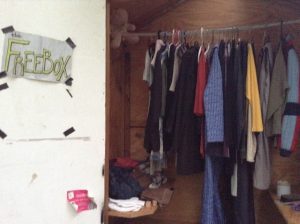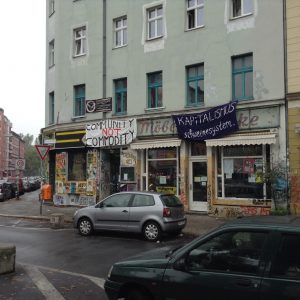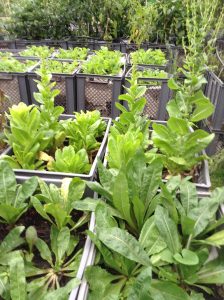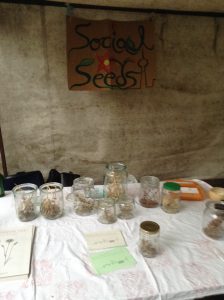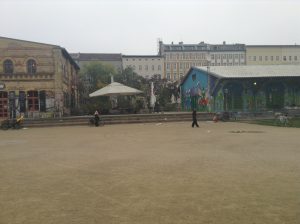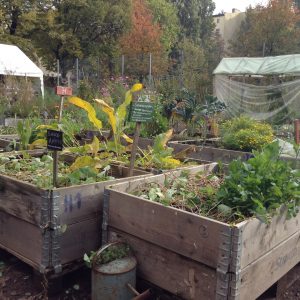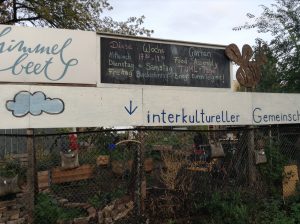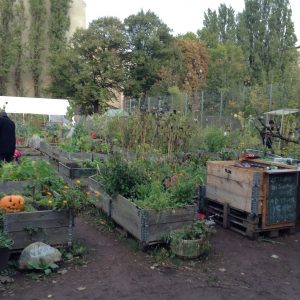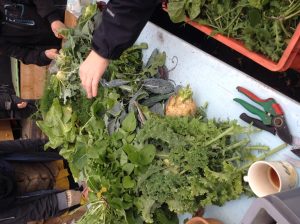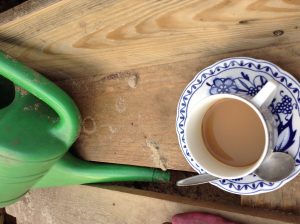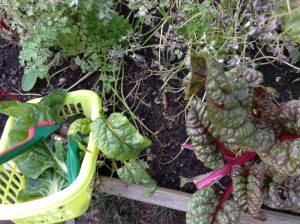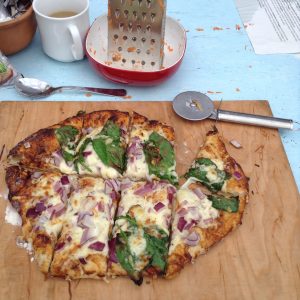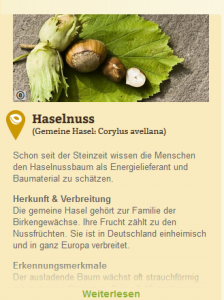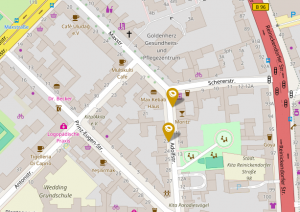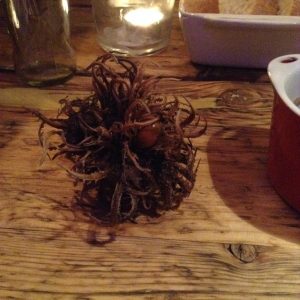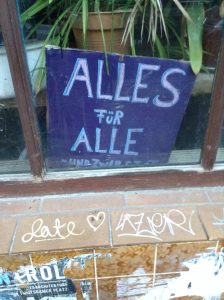Exploring food sharing in BERLIN, Fall 2016
Published by Oona Morrow on the 28th November 2016.
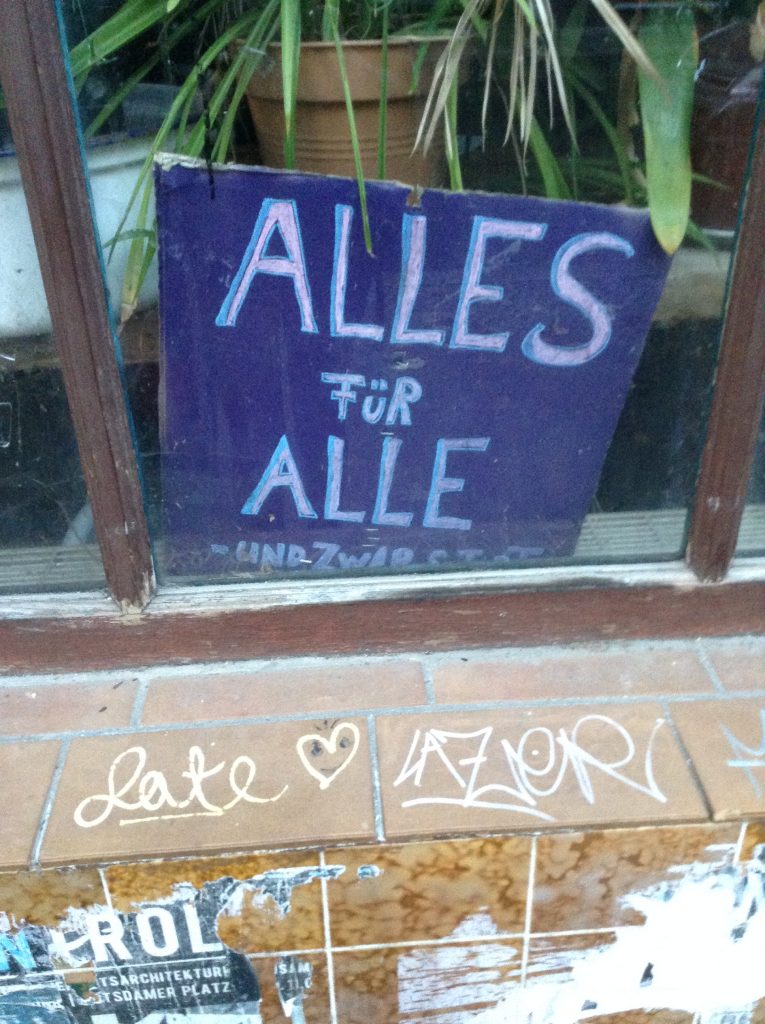
I am back in Dublin with the SHARECITY research team after a month of field work in Berlin. I was hosted by ZTG (the Center for Technology and Society) at Technical University Berlin. At ZTG, researchers are working together on a number of exciting and trans-disciplinary projects about urban gardening, social innovation, smart cities, social movements, ICT, and sustainability. ZTG was a wonderful intellectual base – and a great place to defrost after a long day in the field.
There is a lot of sharing and gifting happening in Berlin, it is a lifestyle choice, but also a deep ethical and political commitment. Compared to other cities I have lived in, I was struck by how generous people were with their time. The people I met were never “too busy” and placed a very high priority on sharing skills, resources, food, clothes, and experiences with others. I can see why this environment has fostered the growth of so many subcultures, alternative economies, and money-free movements. There are numerous free shops, squats, alternative media centers, lending stores, seed libraries, swap shops, and fair-teiler (public food distribution points). During my first weekend I was the beneficiary of a shared meal and some new (to me) clothes at a Free Market that Yunity had organized in Kreuzberg’s Görlitzer Park. Yunity is a project that was started by members of foodsharing.de to develop a multi-sharing platform, it has since developed into a social movement dedicated to living the dream of unconditional sharing. This feeling of unconditional generosity proved to be a constant theme during my visit.
Berlin is also the urban gardening capital of Germany, and its high profile urban gardens like Prinzessinnengarten and Allmende Kontor attract visitors from all over the world. Many Berlin gardens are also inter-cultural gardens that seek to promote cross cultural encounters, understanding, and social inclusion. For a month, I joined the ranks of international scholars and tourists who are descending on these gardens. I was fortunate to find a garden whose mission deeply inspired me – and would tolerate yet another garden researcher! I also had the chance to spend time with some wonderful urban gardening researchers – including José Carlos Lázaro from Brazil and Anna Dańkowska from Poland, and Toni Karge, whose MA thesis on Himmel Beet has been an invaluable resource.
I spent much of my time with gardeners and neighbours at Himmel Beet an intercultural community garden in the diverse neighborhood of Wedding. Himmel Beet places a high priority on social inclusion as well as the transformative potential of encountering others in shared urban spaces. Although the season was coming to an end, there were still lots of ways to get involved and spend time in the garden. Drinking a coffee in the low waste café. Baking bread and pizza in the community bread oven. Picking my own vegetables from the community garden beds.
And screen printing, cooking, and sharing a meal with the wonderful people at TUML, a unique project that stages a politics of encounter between people of diverse abilities and backgrounds through workshops and garden work. At Himmel Beet, food sharing happens in almost all of the forms we identified in the SHARECITY100. Land is shared by community members and individual raised beds are also privately rented. Fresh veggies are sold through a pick your own scheme, and sometimes gifted. Meals are sold through the low waste cafe but also shared freely at community meals, especially during communal bread baking. Kitchens spaces and devices are shared, including a fantastic outdoor community bread oven. Knowledge and skills around gardening, cooking, sour dough cultures, bread dough kneading, bicycle repair, fire building, carpentry, and community concerns are widely shared. So is compost.
I also used Mundraub an online mapping platform for fruit and nut trees and edible plants in public spaces. After getting lost a few times, I was successful in harvesting a few end of the season hazelnuts growing on a residential street in Wedding. I also spoke with a few mundraub users about their experience using the platform. And had the chance to meet Adrien Labaeye, a geographer who has been researching mundraub and other online food mapping platforms for his PhD. He also contributes to a fantastic resource, TRANSFORMAP, which is an open source platform for mapping alternative economy, food, and sustainability projects. However, rather than reinventing the wheel – this map “the mother of many maps” draws data from hundreds of already existing interactive maps and databases.
I was very impressed by the vibrant food waste cooking scene in Berlin. At Baumhaus In Wedding I ate the delicious and convivial meals prepared by The Real Junk Food Project Berlin, learned about several local CSAs, picked up some produce from foodsharers, and made some noise in the improvisational groove orchestra. At Restlos & Glücklich e.V. in Neu Köln I returned to my long time job of waiting tables, and served a three course food waste menu to very appreciative eaters. The staff and volunteers are really dedicated, and the food is delicious too.
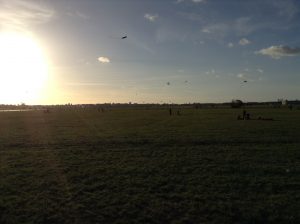 Finally, I’d like to call attention to the amazing people and collectives that are bringing it all together, making connections, organizing events, fighting for better policy, and building activist and political networks around food, solidarity economy, and sustainability. Baumhaus, in Wedding, is a community built event space and indoor tree house that fosters collaboration, innovation, and conviviality among change makers in the field of sustainability. Many Baumhaus and Himmel Beet members also cross pollinate their skills and talents through Wedding Wandler, the transition town network for Wedding which facilitates several neighborhood food sharing, gifting, and sustainability initiatives. Meanwhile SoliWedding is making a neighbourhood atlas of solidarity initiatives– their forthcoming online atlas includes everything from pollinator hotels to the locations of Berlin FreieFunk (grassroots community WiFi). In Neu Köln, Trial & Error, is a kulturlab, which hosts repair cafes, CSA distributions, a swap shop, a foodsharing.de fair teiler, and numerous re-skilling, self-help, and solidarity economy workshops and events. Also in Neu Köln, is Agora Collective, an art, food, and co-working space that fosters reflection on alternative models for cultural, social and economic production. Nearby in Kreuzberg, SUPERMARKT curates fantastic workshops and events on digital culture, alternative economies, and new forms of work. And in Alt-Treptow Lakunabi, the laboratory for art and sustainability keeps one of the most comprehensive sustainability events calendars in Berlin, and Carla “the network weaver” works tirelessly to connect sustainability actors working across diverse sectors, cultures, and neighborhoods. Transition Pankow, the transition towns hub for the Pankow district has also been a long time incubator for sustainable and circular economy projects in Berlin. They have done a great deal to promote and research the concept of edible neighborhoods and promote sharing. And last but not least, Berlin’s vibrant Food Policy Council is doing everything they can to bring together diverse stake holders, cultivate ideas, dreams, and policy proposals for sustainable food futures in the Berlin-Brandenburg region.
Finally, I’d like to call attention to the amazing people and collectives that are bringing it all together, making connections, organizing events, fighting for better policy, and building activist and political networks around food, solidarity economy, and sustainability. Baumhaus, in Wedding, is a community built event space and indoor tree house that fosters collaboration, innovation, and conviviality among change makers in the field of sustainability. Many Baumhaus and Himmel Beet members also cross pollinate their skills and talents through Wedding Wandler, the transition town network for Wedding which facilitates several neighborhood food sharing, gifting, and sustainability initiatives. Meanwhile SoliWedding is making a neighbourhood atlas of solidarity initiatives– their forthcoming online atlas includes everything from pollinator hotels to the locations of Berlin FreieFunk (grassroots community WiFi). In Neu Köln, Trial & Error, is a kulturlab, which hosts repair cafes, CSA distributions, a swap shop, a foodsharing.de fair teiler, and numerous re-skilling, self-help, and solidarity economy workshops and events. Also in Neu Köln, is Agora Collective, an art, food, and co-working space that fosters reflection on alternative models for cultural, social and economic production. Nearby in Kreuzberg, SUPERMARKT curates fantastic workshops and events on digital culture, alternative economies, and new forms of work. And in Alt-Treptow Lakunabi, the laboratory for art and sustainability keeps one of the most comprehensive sustainability events calendars in Berlin, and Carla “the network weaver” works tirelessly to connect sustainability actors working across diverse sectors, cultures, and neighborhoods. Transition Pankow, the transition towns hub for the Pankow district has also been a long time incubator for sustainable and circular economy projects in Berlin. They have done a great deal to promote and research the concept of edible neighborhoods and promote sharing. And last but not least, Berlin’s vibrant Food Policy Council is doing everything they can to bring together diverse stake holders, cultivate ideas, dreams, and policy proposals for sustainable food futures in the Berlin-Brandenburg region.
Thank you all for the very warm welcome, and I look forward to seeing you again this winter!
© 2015 - 2025 ShareCity | Web Design Agency Webbiz.ie
